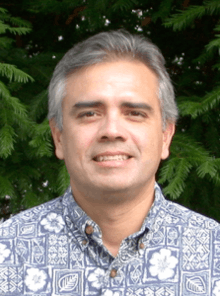James Zachos
James Zachos is an American paleoclimatologist, oceanographer, and marine scientist. He is currently a professor and chair of the Department of Earth and Planetary sciences at University of California, Santa Cruz where he was elected to the National Academy of Sciences in 2017.[1][2] He has conducted research on a wide variety of topics related to biological, chemical, and climatic evolution of late Cretaceous and Cenozoic oceans, and he is recognized for transforming our understanding of long-term climate change and climate transitions in the past 65 million years.[3] His investigations of past climatic conditions are intended to improve our ability to understand the consequences of anthropogenic carbon emissions on future climate change.[4]
| James Zachos | |
|---|---|
 James Zachos | |
| Born | California |
| Alma mater | |
| Occupation | Oceanographer |
| Employer |
|
| Awards |
|
Professor Zachos has co-authored over 160 publications and has been invited to give over 140 lectures at institutions, universities, and conferences around the world, including Stanford University, University of Cambridge, and Utrecht University, University of Sao Paolo, and International Conference on Paleoceanography VIII.[5] He has also participated on multiple Ocean Drilling Program (ODP) Expeditions to the Arctic and Southern Ocean, Pacific and Indian Oceans. In 2004, Zachos served as the co-chief scientist of Leg 208 expedition to the south Atlantic.[6]
Zachos is a fellow of the Geological Society of America, American Academy of Arts and Sciences, and American Geophysical Union. In 2016, he received the Milutin Milankovic Medal by the European Geosciences Union, which is awarded to scientists for their outstanding research in long-term climatic changes and modelling.[7]
Research
James Zachos’ research is focused on the biological, chemical, and climatic evolution of late Cretaceous and Cenozoic oceans (i.e., the last 66 million years).[8] This research typically involves analysis of the chemical and isotopic composition of fossil shells from marine sediments to reconstruct past changes ice-volume, ocean temperatures, circulation, productivity, and carbon cycling.[9] Combined with numerical models, such observations are used to determine the mechanisms responsible for the long and short-term changes in global climate. Presently, Zachos’ research group is studying several episodes of rapid and extreme changes in climate including the Paleocene-Eocene Thermal Maximum.[10]
Academic Background
In 1981 Zachos received bachelor's degrees in Geology and Economics from the State University of New York, Oneonta.[11] Zachos obtained his M.S. in Geology (1983) at The University of South Carolina and a Ph.D. in Geological oceanography at the University of Rhode Island. After completing his education, he pursued a postdoctoral fellowship at University of Michigan from 1988 to 1990 before joining the faculty of the Department of Earth Sciences UC Santa Cruz in 1992. In 2000 he was a visiting fellow at the University of Cambridge.
Recognition
- Ida Benson-Lynn Endowed Chair of Ocean Health (2018)
- Foreign Member, Royal Netherlands Academy of Arts and Sciences (2018)[12]
- Member, National Academy of Sciences (2017)
- Milutin Milankovic Medal, European Geosciences Union (2016)
- Highly Cited Researcher ESI (2014)
- Chauncey D. Holmes Lecture, Syracuse University (2014)
- Distinguished Achievement Award, University Rhode Island (2011)
- Fellow, California Academy of Sciences (2011)
- Fellow, American Academy of Arts and Sciences (2011)
- Humboldt Research Award (2008)
- USSSP Distinguished Lecturer (2007)
- Emiliani Lecture, American Geophysical Union (2006)
- CIRES Distinguished Lecture, University of Colorado (2005)
- Henry Charnock Lecture, Southampton University (2004)
- Fellow, Bremen University Visiting (2004)
- Fellow, Geological Society of America (2004)
- Vetlesen Distinguishing Lecture, University of Rhode Island (2004)
- Visiting Fellow, University of Cambridge (2000)
- National Young Investigator (1994)
- JOI-USSAC Distinguished Lecturer (1993)
References
- https://news.ucsc.edu/2017/05/zachos-national-academy.html
- Stephens, Tim. “Climate scientist James Zachos elected to National Academy of Sciences”. UC Santa Cruz Newscenter. 2017-05-02.
- University of California, Santa Cruz. eps.ucsc.edu.
- Nyack, Al. “Ocean Acidification in Earth’s Past: Insights to the Future”. Metcalf Institute for Marine & Environmental Reporting. Retrieved 2018-02-08.
- UC Santa Cruz. websites.pmc.ucsc.edu
- Ocean Discovery Program. “A Rapid Rise in Greenhouse Gas Concentrations 55 Million Years Ago: A Deep-Sea Perspective on the Causes and Consequences”. Retrieved 2018-02-08.
- European Geosciences Union. MILUTIN MILANKOVIC MEDAL. 2016. Retrieved 2018-02-06
- Underwood, Time. “Zachos of UC Santa Cruz Speaks About Climate Change Jan. 25. Furman University News. 2018-01-12.
- University of California, Santa Cruz. eps.ucsc.edu
- Yale University. “Paleocene/Eocene Thermal Maximum”. The People of Geology & Geophysics . Retrieved 2018-02-08.
- Stephens, Tim. “Earth scientist James Zachos elected fellow of the American Geophysical Union”. UC Santa Cruz Newscenter. Retrieved 2008-02-14.
- "James Zachos". Royal Netherlands Academy of Arts and Sciences. Archived from the original on 26 April 2020.